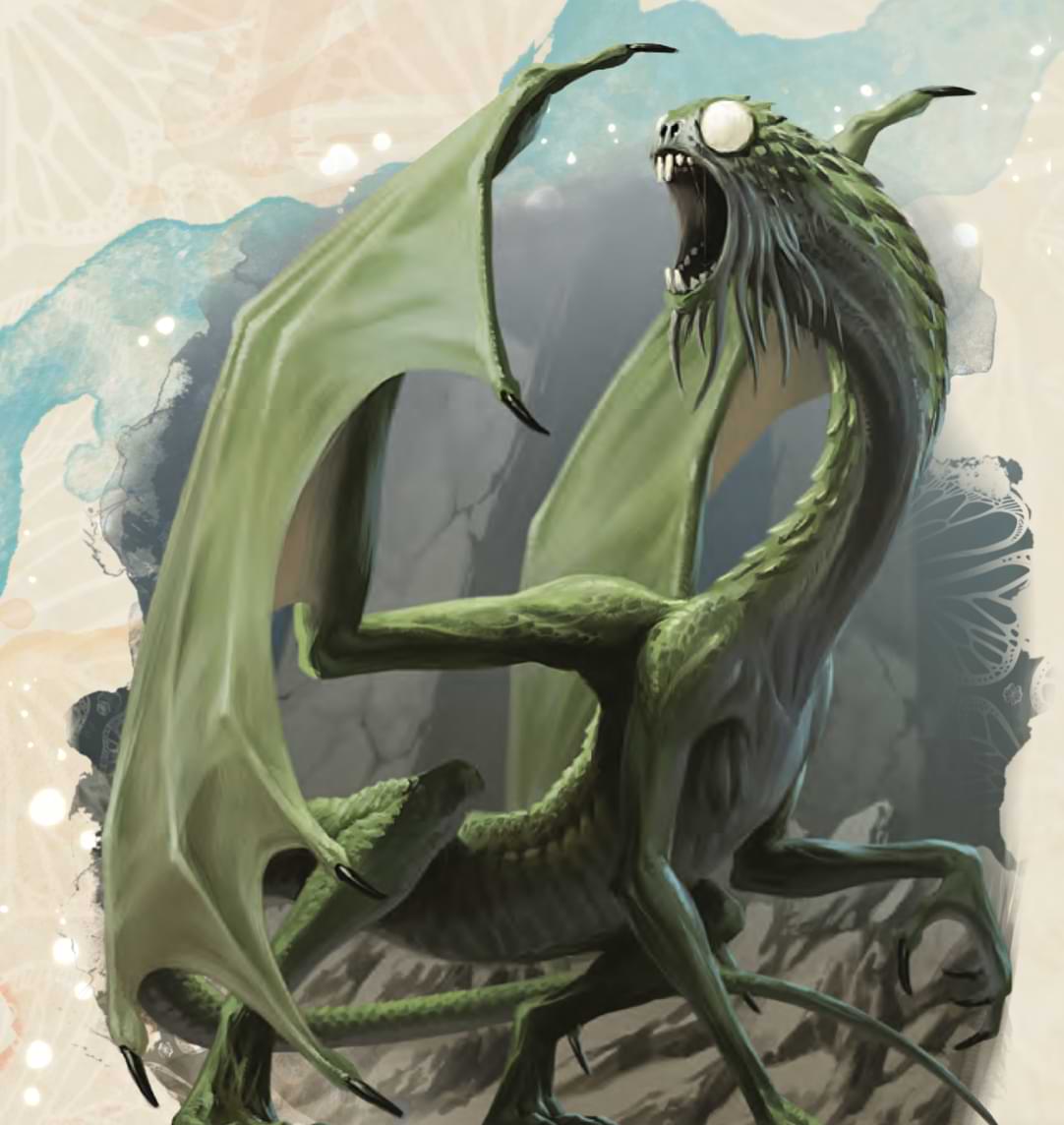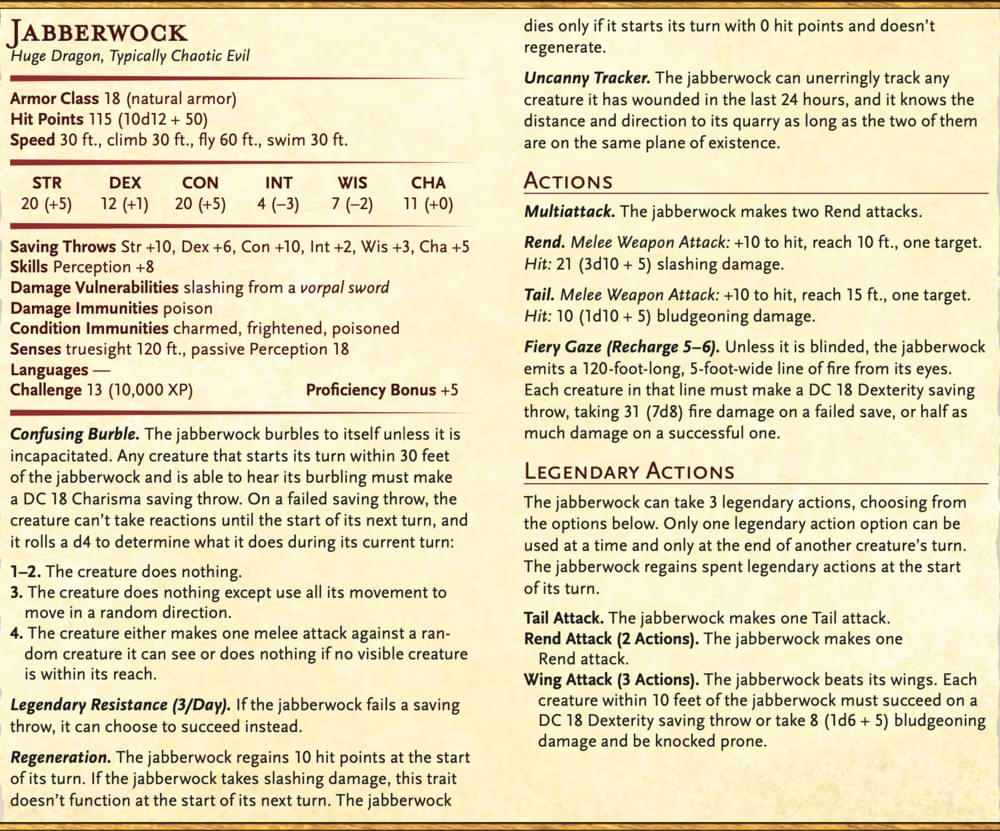
[ad_1]
With the September 21 release of The Wild Beyond the Witchlight, the jabberwock makes its return to Dungeons & Dragons. The dragon first appeared in second edition D&D’s Monstrous Compendium Annual: Volume III, but it has its roots in other works. It originated in Lewis Carroll’s 1871 poem “Jabberwocky,” which was published as part of the novel Alice Through the Looking-Glass. The creature has since become a fixture in popular media as well as other fantasy tabletop RPGs, and its esoteric nature makes it perfect for an adventure set in the Feywild.
Here’s a sneak peek at the jabberwock in all of its peculiar glory:

“The jabberwock, with eyes of flame
Came whiffling through the dense wood
And burbled as it came!”
— “Jabberwocky” by Lewis Carroll
Monster preview: Jabberwock
A jabberwock is a solitary, temperamental predator that haunts pristine forests and ancient ruins. Accurate descriptions of jabberwocks are difficult to come by, because the rare survivors of an encounter with one retain only a confused impression of its parts and not a sense of the whole. Pieced-together accounts describe it as a sinewy, dragon-like creature that can walk on its hind legs as easily as it travels on all four. Its eyes can emit fiery beams.
Source: The Wild Beyond the Witchlight
The jabberwock is a powerful foe worthy of being used as the final boss in a campaign. Its Confusing Burble is the cornerstone of its stat block. An ode to the nonsensical words that defined Carroll’s poem, the jabberwock’s hypnotic mumblings can leave any hero who dares to stand near it a gibbering mess. Avoiding this ability will require characters to invest in a set of earplugs or corral the dragon into the center of a silence spell, lest they risk losing their turn again and again.
Confusing Burble. The jabberwock burbles to itself unless it is incapacitated. Any creature that starts its turn within 30 feet of the jabberwock and is able to hear its burbling must make
a DC 18 Charisma saving throw. On a failed saving throw, the creature can’t take reactions until the start of its next turn, and it rolls a d4 to determine what it does during its current turn:
1–2. The creature does nothing.
3. The creature does nothing except use all its movement to move in a random direction.
4. The creature either makes one melee attack against a random creature it can see or does nothing if no visible creature is within its reach.
The jabberwock’s Fiery Gaze punishes characters that line up. The ability is reminiscent of a dragon’s breath weapon. The jabberwock fires off an eye beam in a 120-foot line, dealing 31 (7d8) fire damage on a failed save and half as much on a successful one. This attack recharges on a 5 or 6 on a 1d6 roll, but smart adventurers can disable it by blinding the jabberwock.
Fiery Gaze (Recharge 5–6). Unless it is blinded, the jabberwock emits a 120-foot-long, 5-foot-wide line of fire from its eyes. Each creature in that line must make a DC 18 Dexterity saving throw, taking 31 (7d8) fire damage on a failed save, or half as much damage on a successful one.
Jabberwocks typically focus on a single target at a time. Against them, the jabberwock will make judicious use of its Rend and Tail attacks. If the jabberwock needs to get a host of creatures off its back, it can use its Wing Attack legendary action to damage all foes within 10 feet of it and knock them prone. If the jabberwock’s primary target attempts to flee, the creature will hunt it down using its Uncanny Tracker ability, which allows it to know the direction and distance of any creature it has damaged in the last 24 hours.
The jabberwock has one more trick up its scaley sleeve that will leave characters flummoxed: Regeneration. This trait lets the jabberwock recover 10 hit points at the start of its turn unless it takes slashing damage. The dragon is also vulnerable to slashing damage from a vorpal sword. This is another reference to Carroll’s poem, which stars a knight battling the jabberwock with such a blade:
“One, two! One, two! And through and through
The vorpal blade went snicker-snack!
He left it dead, and with its head
He went galumphing back.”
Jabberwock statistics

Playing with the jabberwock at your table
The jabberwock is best portrayed as the alpha predator of a forest or ruin that has an almost mythological quality. People who live on the outskirts of its territory might speak of it in hushed tones or doubt that it even exists, thanks to unreliable observer accounts that only describe portions of the creature — for instance, its creepy murmurs or bulbous eyes.
In combat, the jabberwock’s tendency to focus on a single target should be expounded upon. Other creatures might split up their attacks between party members and react with some degree of logic, but not the jabberwock. To put players on edge, roll a die at the start of combat to determine which character has drawn the jabberwock’s ire. Then, only switch targets when the first one has been knocked out — or killed.
For an adventure hook involving the jabberwock, see below.
The dark depths of Mistmasch Wood
How many hours have passed since you first set foot onto Mistmasch’s gnarled trails? It can only have been a few, but it feels like days. All sense of time has vanished in this bewitching forest, and its twisted, many-branched trees stretch so far overhead that they seem to be completely covering the sun — or is it the moon? Your compass has ceased working, and the mist is so thick you can barely see your hands in front of your face.
Your sole companion is the mumbling that echoes through the mist, confounding your thoughts and making you question why you ventured here in the first place. That frightful, accursed garbling. It just won’t go away … and it seems to be growing louder.
Mistmasch Wood is a strange forest that can be injected into any campaign setting. Located about a day’s travel from a village named Tulgei, the forest always seems to be obscured by a thick mist. Tulgei locals speculate that Mistmasch is home to a large fey crossing. Many refuse to enter the woods, fearing for their safety. Those who have tested their luck have either gone missing or emerged gibbering about a dragonlike monstrosity. However, the town healer will occasionally venture to the outskirts of Mistmasch Wood to collect flowers used to brew potions of healing.
Alyce Humphrey, the daughter of one of the first sages to ever study a jabberwock, came to Tulgei a week ago. Ignoring everyone’s advice, she ventured into the woods with a team of three adventurers, claiming that she was interested in the Feywild and had a powerful vorpal sword to defeat any monsters that crossed her path. She and her party have been missing ever since. While the superstitious locals would normally be quite happy to forget her, one of her adventuring companions was the estranged son of Tulgei’s mayor, who is beside himself with grief and willing to pay handsomely for news of his child.
Mistmasch Wood is the perfect location for an adventure involving troublesome Feywild creatures like darklings and redcaps, culminating in a battle with the jabberwock. Dungeon Masters might consider making the forest mazelike similar to the Lost Woods in The Legend of Zelda series. Players can easily lose their way and be haunted by the laughter of fey spirits from the murky darkness, not to mention the crazed whispers of the jabberwock. Whether Alyce Humphrey and her companions remain alive or dead is up to the DM, but hopefully that vorpal sword lies hidden in the wood somewhere, waiting for hardened adventurers to put it to good use!
More creatures of the Feywild to come
The jabberwock is only one of several new fifth edition fey creatures in The Wild Beyond the Witchlight. Whether you’re new or familiar with this frightful beast, the jabberwock won’t disappoint with its peculiar range of abilities and traits. May its unnerving barbles haunt the ears of your players, and may their blades all go snicker-snack!
Jeremy Blum (@PixelGrotto) is a journalist, gaming blogger, comic book aficionado, and fan of all forms of storytelling who rolled his first polyhedral dice while living in Hong Kong in 2017. Since then, he’s never looked back and loves roleplaying games for the chance to tell the tales that have been swirling in his head since childhood.
[ad_2]





